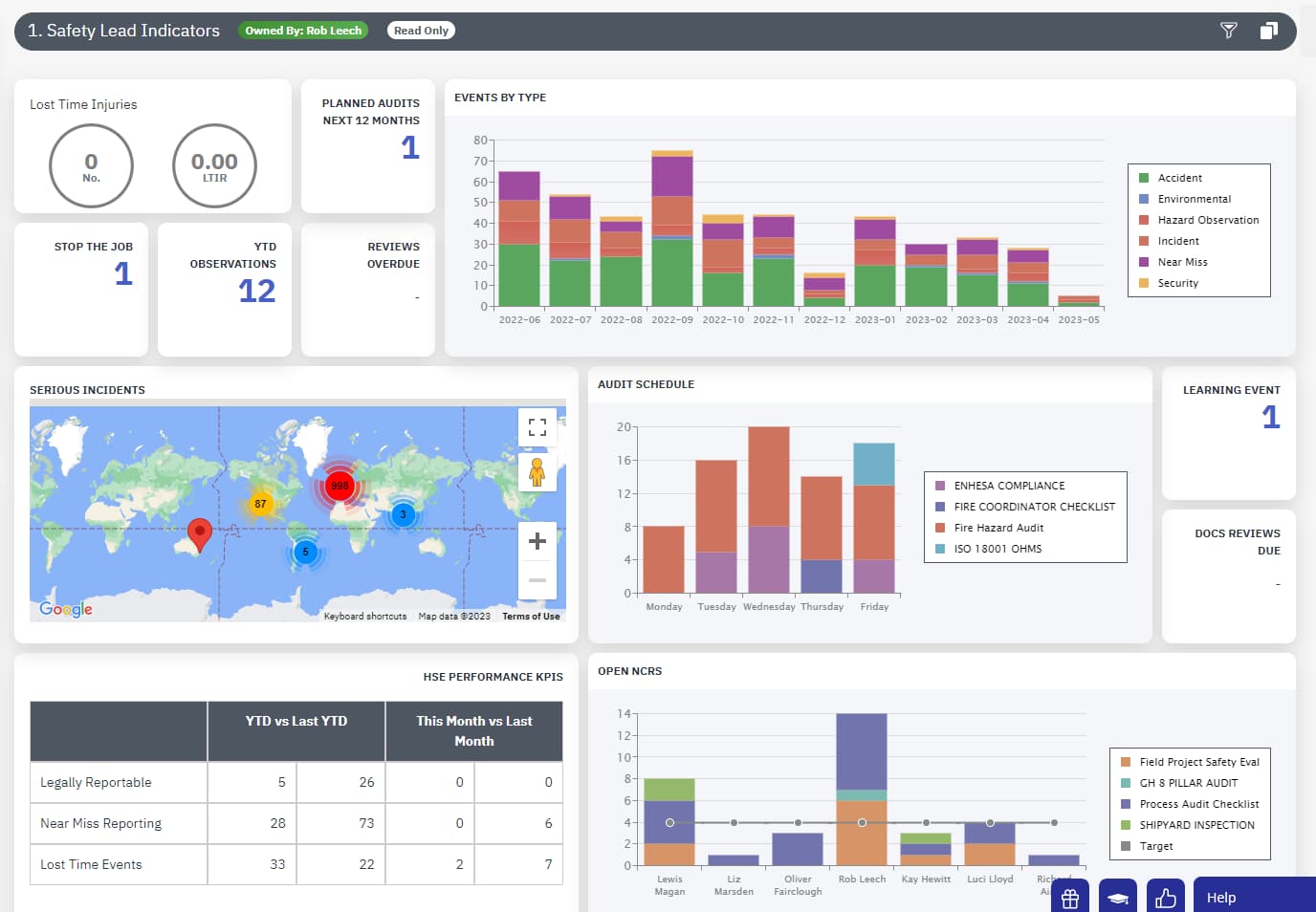
RIDDOR Meaning & Definition
What is RIDDOR?
RIDDOR, or the Reporting of Injuries, Diseases and Dangerous Occurrences Regulations 2013, is health and safety law in the UK. It requires companies and all those deemed ‘responsible persons’ to both report and maintain records of any workplace accidents or work-related injury.
The US equivalent of RIDDOR is an OSHA Recordable, which focuses on a day’s lost time. In the US most accidents are not reported in real time, and in most cases, OSHA does not directly involve itself in investigating accidents.
RIDDOR legislation was significantly updated in 2013, becoming more streamlined and easier to use. RIDDOR is a legal requirement that applies to every workplace in the country but also covers the self-employed and incidents that affect members of the public.
Its scope is wide-ranging and includes the following:
- work-related accidents which cause death
- work-related accidents which cause certain serious injuries
- cases of certain industrial diseases
- certain dangerous occurrences even if no injuries occur
Reduce Workplace Risks and Hazards
Learn how to actively drive a more mature safety culture with our FREE 17 page guide discussing how reporting incidents, close calls and observations can help transform your safety culture.
Why Is RIDDOR important?
RIDDOR has become the cornerstone of health and safety procedures in the country and is seen as pivotal in helping to keep workplaces safe around the country.
The International Labour Organisation estimates that around 2.3 million employees receive fatal injuries at work, or succumb to their diseases over the course of the year. Globally, the ILO states that there are 340 million occupational accidents in a year, as well as 160 million illness-related incidents.
It’s clear that workplaces are far from perfect, but RIDDOR is designed to hold employers accountable for what happens on their watch while encouraging better health and safety procedures within companies. It also helps the government keep a firm check on employers and hold them responsible for any negligence on their part.
Employers can receive penalties or fines for not adhering to the guidelines set by RIDDOR, and in certain serious situations, a prison sentence might be handed out too.
What incidents should be reported under RIDDOR?
1. Deaths
Any death that occurs within or in connection to a workplace needs to be reported under RIDDOR, with the exception of suicides. This includes death that may have been caused by an incident in the workplace, even if the death itself doesn’t occur at the workplace. This also includes death caused due to physical violence by a worker.
2. Specified Injuries
Any major injuries that require medical treatment should be reported under RIDDOR, and include, but are not limited to the following:
- bone fracture diagnosed by a registered GP, other than to a finger, thumb, or toe
- amputation of an arm, hand, finger, thumb, leg, foot, or toe – whether in an incident in the workplace or surgically in the aftermath.
- injury diagnosed by a registered GP as being likely to cause permanent blinding or reduction in sight in one or both eyes
- crush injuries to the head or torso causing damage to the brain or internal organs in the chest or abdomen
- burn injuries (including scalding) which cover more than 10% of the whole body’s total surface area or causes significant damage to the eyes, respiratory system, or other vital organs
- scalping that requires hospital treatment
- loss of consciousness caused by head injury or asphyxia
- other injuries that arise from working in an enclosed space which leads to hypothermia or heat-induced illness, or requires resuscitation or admittance to hospital for more than 24 hours
3. Occupational Diseases
An occupational disease is deemed as ill-health that has been caused, or made worse, by work practices. These include, but are not limited to the following:
- Severe cramp of the hand or forearm.
- Hand-arm vibration syndrome.
- Carpal tunnel syndrome.
- Tendonitis or tenosynovitis of the hand or forearm.
- Occupational dermatitis.
- Occupational asthma.
- Any occupational cancer.
- Any disease caused by occupational exposure to a biological agent
4. Dangerous Occurrences
Not all incidents reported to RIDDOR involve actual physical injury. A dangerous occurrence is an incident deemed serious enough that they could have caused serious injuries, even if they, fortunately, do not.
The list of possible dangerous occurrences would be endless, but here are some of the most common that are reported under RIDDOR:
- the collapse of machinery and structures
- explosions and bursting of pipework and closed vessels
- contact with overhead power lines
- electrical fires or explosions
- demolition failure, unintentional explosions, or misfires
- accidental release of biological agents or substances which may damage health
- scaffold collapse
- failure of diving equipment
- train collisions
- the unintended collapse of a building or structure, wall or floor, falsework
- uncontrolled release of flammable liquids and gases.
5. Over Seven-Day Incapacitation of a Worker
Accidents must be reported when they result in an employee or a self-employed individual having to take time off from work, or if they’re unable to discharge their duties, for a period of more than seven consecutive days due to their injury.
The seven day period doesn’t include the day of the accident, though it counts rest days and weekends. Reports must be submitted within 15 days of the accident.
6. Non-fatal Injuries to non-workers
Accidents to non-workers, including members of the public, must also be reported if they result in an injury and the person has to be taken directly from the site of the accident to the hospital for treatment.
If the accident occurs at the hospital premises, the report is only required if a specified injury (listed in point 2) occurs.
Who is responsible for RIDDOR?
The onus for reporting and maintaining reports relating to RIDDOR falls on the employer. While general employees are not required by law to report incidents, most companies stipulate that reporting incidents that they witness to their superior is part of their job requirement.
Employee Responsibilities
General employees do not have a legal obligation to report an incident under RIDDOR. But, if an employee witnesses or suffers from an incident that falls under RIDDOR, they can report it to their supervisor.
General employees cannot report incidents under RIDDOR, only employers can. If an employer fails to take action, the employee may want to consider contacting their employee or union representative.
Employer Responsibilities
According to RIDDOR, employers or ‘responsible persons’ have a legal obligation to report any work-related incident. This also includes self-employed individuals. There is an online form that employers can fill out to file a report.
And, for proper reporting purposes, the organisation should consider maintaining an accident book where they log all accidents.
What records do companies need to keep?
It’s important to keep a record of any reportable injury, over-seven-day injury, disease, or dangerous occurrence. After logging an incident with RIDDOR there is an option to download a personal PDF copy of the report, which is always recommended.
Most businesses are required to keep an accident book (B1510) under Social security Law and any incident reported to RIDDOR must also be logged here and should include the following basic information at the bare minimum:
- the date
- time and place of the event
- personal details of those involved
- a brief description of the nature of the event or disease
- Details of treatments
- Authorised signature and name of person who prepares the record
If, after a RIDDOR reported incident, it’s found that changes need to be made to try and reduce the chances of such an incident happening again, it’s important that these changes also be recorded carefully as they may well be investigated.
Employers are also advised to record all incidents or near-misses in the workplace, irrespective of how they impact an individual’s ability to work.
Reduce Workplace Risks and Hazards
Learn how to actively drive a more mature safety culture with our FREE 17 page guide discussing how reporting incidents, close calls and observations can help transform your safety culture.
Exemptions
There are certain exemptions that are allowed under RIDDOR. Incidents that are reported under other legislation, such as civil aviation events, electrical safety issues, or those reported within nuclear installations do not need to be reported.
More importantly, RIDDOR also exempts reporting requirements for deaths that occur in relation to:
- Duty performed by armed forces members
- Road traffic accidents
- Dental or medical treatment
What is the timeframe for reporting a RIDDOR incident?
You should immediately report any incident involving death, major injury, and dangerous occurrences by the quickest practical means, with the full RIDDOR report submitted within 10 days.
Over 7-day injuries should be reported within 15 days of the incident and where incapacitation or workplace injury doesn’t immediately show after the event, a report should be made as soon as the injury becomes apparent.
Over 7 Day Injuries
If a person is away from work for seven or more consecutive days due to an incident occurring in the workplace, it is deemed as a 7-day injury and should be reported. It also includes a 7-day period where a person is unable to do the full range of their normal duties because of an incident in the workplace, but still remains at work.
Gas Incidents
Gas incidents should be reported immediately to the authorities under RIDDOR. If you are a distributor, filler, importer, or supplier of flammable gas you must report incidents if you learn someone has died, lost consciousness, or been hospitalised due to an injury connected with the gas you were responsible for.
Gas engineers are also required to provide details of appliances or fittings they believe to be a danger to life or could cause unconsciousness or hospital treatment – whether this is down to poor design, or personal negligence.
Members of the public
Any accident that involves members of the public being taken to hospital for medical treatment or injury must be reported under RIDDOR.
What happens if an incident is not reported to RIDDOR?
Failure to follow the outlined procedures above could potentially open the door to prosecution by local authorities or relevant bodies.
This could lead to a substantial fine and at worse, a prison sentence. Additionally, you must be able to show that you acted to mitigate the likelihood of such an incident occurring again.
For example, if an accident happens in the workplace because of faulty equipment and the owner or ‘responsible persons’ fails to properly address it, this could also lead to prosecutions and the possibility of paying workers compensation.
Reduce Workplace Risks and Hazards
Learn how to actively drive a more mature safety culture with our FREE 17 page guide discussing how reporting incidents, close calls and observations can help transform your safety culture.



